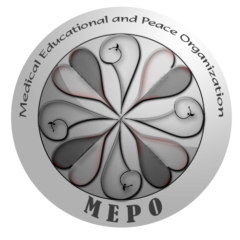To create the House of Flowers with a coherent vision meant ensuring that the staff were all trained in consistent policies of everything from how to treat a sick child, to how to use Montessori materials, to methods of disciplining children without hitting them. Mostafa and Allison undertook this training, working directly with the House staff during the first four years, and then communicating via email and phone with the staff for the following six years.
In the beginning, Mostafa, as a medical doctor, worked with the staff on first aid, nutrition, physical education and health and hygiene. He made sure that the cook was producing well-balanced, nutritious meals and that the children received fruit regularly. He taught the staff basic first aid, and gave the children regular check-ups. He provided extensive guidance on management and organization in the House of Flowers and under his supervision, the House management became efficient and smooth, as it continues today even without Mostafa and Allison’s presence.
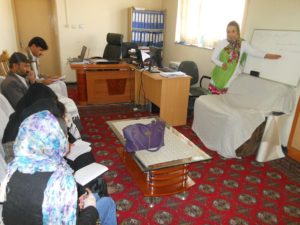 Allison worked with the teachers in developing the education program. Allison is a trained Montessori teacher, with elementary certification from AMI (Association Montessori Internationale). This training requires an intensive 10 months of study, something that was not viable for the House of Flowers staff. So Allison trained the teachers in the criticial principles and philosophy of Montessori education. As the House acquired Montessori materials through the donations, she taught the teachers how to use the materials with the children and how to maintain a Montessori environment. She told them the cosmic fables, and the four planes of development, and helped make materials in the classrooms.
Allison worked with the teachers in developing the education program. Allison is a trained Montessori teacher, with elementary certification from AMI (Association Montessori Internationale). This training requires an intensive 10 months of study, something that was not viable for the House of Flowers staff. So Allison trained the teachers in the criticial principles and philosophy of Montessori education. As the House acquired Montessori materials through the donations, she taught the teachers how to use the materials with the children and how to maintain a Montessori environment. She told them the cosmic fables, and the four planes of development, and helped make materials in the classrooms.
The teachers worked very hard to take in this methodology, which was so strikingly different from their own experience teaching in traditional schools. The teachers spent their evenings translating Montessori texts, and writing their own ideas, taking notes. They began writing about their own experiences with a goal of producing a small book for other Afghan teachers. They had become true believers in the approach, having experienced great success with the children of the House of Flowers in terms of the children’s personal and psychological development, level of independence, peacefulness, and even in their traditional academics. Twelve out of the 20 children who attend the local school have skipped one or two grades.
In October 2012, Allison returned to Kabul after 6 years of absence. Her month-long visit was an intensive time of advanced Montessori training, covering topics such as the 3-period lesson technique, nomenclature, the Fundamental Human Needs and the geography charts. She showed them videos of other Montessori classrooms to give them the experience of observation. These videos and lessons were extremely inspiring to the teachers, who became even more strongly motivated and excited about Montessori education.
It is important to realize the stark contrast between traditional education and Montessori education here: all other schools consist of rows of benches, children sitting passively for hours, learning by rote memorization using no materials whatsoever, solely listening to teacher’s lectures in an often harsh and restrictive environment.
Expansion
The national director of orphanages of Afghanistan expressed a desire to expand the model of the House of Flowers to the government orphanages that he was responsible for. He greatly admired the House of Flowers program and requested its dissemination if possible. And so, in October 2012, the teachers of the House of Flowers became trainers.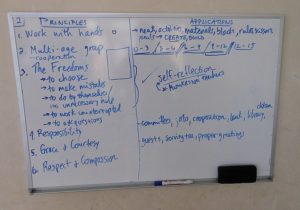
It began with Allison giving two short hour-long refresher lessons to the House of Flowers staff. The first was on Maria Montessori’s developmental model (the four planes of development), which provides a clear understanding of the changing characteristics of children as they develop. The second lesson was on the critical Montessori principles. These principles had provided the foundation for how the House of Flowers works. This lesson provided the link between the four planes of development, pedagogy, and what is a healthy environment for children.
The House of Flowers teachers translated these lessons into Dari, and then invited teachers from the Alluaddin City Orphanage in Kabul to come to the House of Flowers to begin a brief but powerful training program.
On the first day, Fahim, Qudsieh and Fatima of the House of Flowers shared the speaking responsibilities and gave the lesson on the developmental model. The staff of Alluaddin were immediately asked to then sit quietly and observe the functioning of the House of Flowers classrooms, with their mixed age groups and small group lessons and hands-on work, noting how the classroom activities were based on the developmental levels of the children.
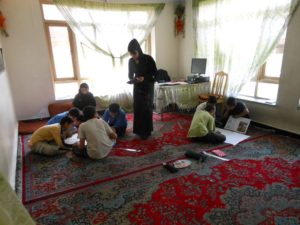 On the second day, the House of Flowers teachers gave the lesson on the critical Montessori principles. Again the staff of Alluaddin observed in the classrooms immediately afterwards, noting the manifestation of
On the second day, the House of Flowers teachers gave the lesson on the critical Montessori principles. Again the staff of Alluaddin observed in the classrooms immediately afterwards, noting the manifestation of
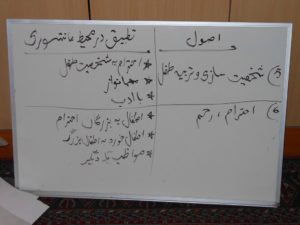
these principles such as the freedom of choice of the children, the non-interference on the part of the teachers, the independence of the children, and the responsibility they took, the grace and courtesy they exhibited; the observeers felt the resulting calm and quiet in the classroom.
These periods of observation were extremely powerful for the visiting teachers. Sometimes they didn’t even want to leave the classrooms since it was so pleasant and peaceful. They came away with a look of amazement in their eyes, having had no idea that children could work in such a way, with such calm self-control and engagement in their work.
Much discussion followed, and the House of Flowers teachers facilitated the question and answer, offering their own experiences and their own solutions.
Although this program has not yet gone further (as of 2017) , we still an encouraged that even a few other teachers and staff have learned about this holistic approach.
